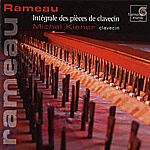With the exception of a few of Bach’s more famous compositions, Rameau’s Pieces de Clavecin have received more attention over the years than any other Baroque keyboard works–and for good reason: they’re extraordinarily diverse, imaginatively conceived, consummately stylish, and most importantly, they demand interpretive prowess on the part of the performer. For many harpsichordists a Rameau cycle represents what a Beethoven symphony cycle would for most conductors–the crowning achievement of the genre, since what a performer brings to Rameau reveals not only his level of technical virtuosity but even more so his ability to creatively exploit the infinite opportunities inherent in Rameau’s innovative scores.
Michel Kiener is a performer who may be new to many listeners because, rather than spend time in a recording studio, he has been quietly teaching in Geneva since 1977 and performs almost exclusively in Europe. Hopefully this situation will change if his remarkable new Rameau cycle is indicative of his talents. Though my collection already includes 16 Rameau cycles, Kiener’s achievement rises to a place among the top three.
With the exception of Blandine Rannou’s wildly eccentric three-CD Zig Zag Territories cycle, Kiener’s overall tempos are the slowest on disc. This is Rameau at his grandest, most elegant, and most expansive, so richly detailed that you not only listen to the performances but also luxuriate in the experience. For those already familiar with these works, imagine hearing them as if filtered through Louis Couperin’s temperament, where momentum is shaped by the delicacy of phrasing and subtlety of attack. However, while he takes his time, Kiener never seems studied or overly precious in his approach (an occasional fault with Rannou); instead he utilizes the “extra” time to extract and imaginatively refine detail.
In the notorious Les Cyclopes for example, Kiener’s runs not only shift momentum to heighten the illusion of trepidation, but he also alters dynamics within the runs, making them seem even more harrowing. Only Scott Ross equals Kiener’s precision and imagination here, though even he lacks Kiener’s consistent probing of the theme. Les Trois Mains is equally invigorating, with Kiener animating the work’s even-tempered structure with subtle tempo fluctuations and scads of dotted rhythms. Like Noëlle Spieth (another eccentric), Kiener takes a similar approach to La Poule, brilliantly measuring the work’s dialogues and interjecting witty, brief pauses that enhance the humor. These are but a few of many examples of Kiener’s remarkable care and passion so amply demonstrated in his reading.
Harmonia Mundi’s first-rate sound perfectly complements Kiener’s performance, giving us a sumptuously full-bodied harpsichord yet never sacrificing clarity of detail. Jorge Cova’s informative notes (excerpted from an integral edition) are engaging and thorough. This is the Rameau event of the year (no, I haven’t forgotten about William Christie’s outstanding Erato recording of Zoroastre), and regardless of your familiarity with these masterpieces, please allow Kiener to surpass all of your expectations. He will.
































